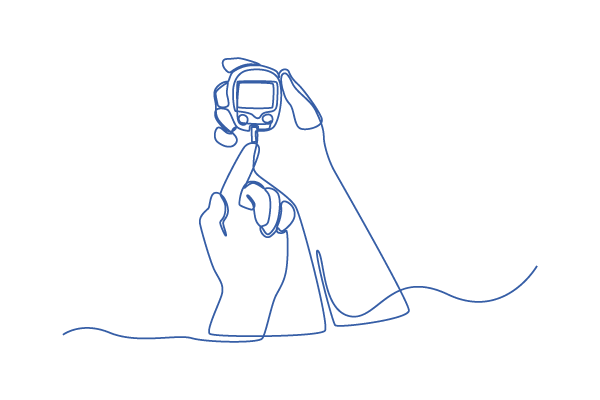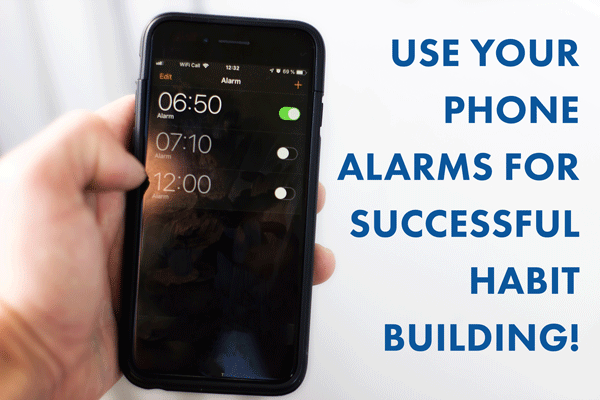Repeat Healthy Activities to Turn Them Into Habits
At Cabin Creek Health Systems (CCHS), we understand that managing Type 2 diabetes is not just about monitoring blood sugar levels; it’s a journey that impacts both your body and your mind. In recognition of Mental Health Awareness Month, we’re focusing on the strong link between mental health and managing chronic conditions like diabetes. We recognize the daily pressures and stress that can arise from staying on top of medication, dietary needs, and blood sugar levels.
We believe that by building simple yet effective habits, patients can achieve better health outcomes for Type 2 diabetes. Whether it’s establishing a regular routine for medication or setting gentle reminders to check your blood sugar, these small steps can create a big difference in managing your health.
What does mental health have to do with Type 2 Diabetes?
Living with a chronic condition like diabetes often brings stress and emotional challenges that can feel overwhelming. Many patients report feeling anxious about fluctuating blood sugar levels or becoming overwhelmed by the daily demands of managing diet, exercise, and medication adherence. In some cases, the relentless focus on maintaining good health can contribute to depression, anxiety, or burnout.
Moreover, it’s important to understand that mental health challenges can also directly impact physical health, sometimes leading to less consistent diabetes management. For instance, high stress levels might trigger unhealthy eating habits or disrupt sleep patterns, making it harder to maintain stable blood sugar levels. This can create a difficult cycle, where poor mental health exacerbates diabetes symptoms and vice versa.
Additionally, the body’s stress hormone, cortisol, plays a role in blood sugar regulation by opposing the action of insulin, which is produced by the pancreas to lower blood sugar levels. Cortisol increases blood sugar by releasing stored glucose. When cortisol levels remain elevated over a long period, it can result in persistently high blood sugar (hyperglycemia), potentially leading to Type 2 diabetes.

But there’s hope! Developing positive behavioral health habits can improve both mental and physical health. By setting up simple routines and reinforcing them with smart strategies like phone alarms, you can establish a reliable structure that reduces uncertainty and builds confidence.
In the next section, we’ll discuss how building these small yet effective habits can pave the way for a healthier and more balanced lifestyle.
Build Positive Habits for Type 2 Diabetes Management
Establishing positive habits can make managing Type 2 diabetes easier and less overwhelming. Here are some key strategies to consider:
- Meal Planning: Creating balanced meal plans that align with your nutritional goals can significantly help in maintaining stable blood sugar levels. This practice also reduces the stress of deciding what to eat on a daily basis. By planning meals ahead of time, you can ensure they are nutritious, portion-controlled, and timed appropriately. Learn more about diabetes and meal planning here.
- Regular Exercise: Physical activity is a cornerstone of diabetes management. A consistent exercise routine helps lower blood sugar levels, improves insulin sensitivity, and enhances overall well-being. Whether it’s a daily walk, yoga session, or a structured fitness regimen, regular exercise is crucial. Try to stick to a schedule where you exercise on the same days of the week at the same times. Having a schedule helps you set yourself up for long-term habit-building success!
- Medication Adherence: Sticking to your prescribed medication schedule is essential for keeping blood sugar levels in check. Set reminders or keep a journal to track your medication intake. This can prevent missed doses, help you remember if you already taken your medication, and ensure your treatment plan remains effective.
- Stress Management: High stress can significantly impact blood sugar levels. Incorporate stress-relief activities like meditation, deep breathing exercises, or hobbies you enjoy to keep stress levels in check. Ask your Cabin Creek Health PCP for a consultation with one of our experts in stress management.
- Routine Blood Sugar Monitoring: Regularly checking your blood sugar levels provides valuable insights into how your lifestyle affects your diabetes management. Use the results to inform adjustments to your diet, exercise, or medication schedule. Keep reading for a key tip to always remember to monitor your blood sugar on time!
Developing these habits may seem challenging at first, but repetition is key.
With practice and consistency, you’ll find it easier to stick to these routines. In the next section, we’ll explore how you can leverage alarms on your smartphone to build these habits and make your diabetes management plan more seamless and effective.
Ask your CCHS primary care physician to consult with a behavioral health provider to help you meet your goals!
Use Your Phone Alarms to Your Advantage
Technology provides helpful tools to reinforce positive habits and build a sustainable diabetes management plan. Alarms on smartphones can act as personalized reminders to help ensure that checking your blood sugar or taking medications is consistent and stress-free. Here’s how you can use these tools to your advantage:

1. Setting Medication Reminders:
- Alarms can help you stay on track with your medication schedule, whether you need to take insulin, oral medications, or supplements.
- Label alarms specifically, such as “Morning Insulin” or “Evening Pills,” to distinguish them easily.
- Customize the sound of the alarm to something that will capture your attention but not startle or stress you.
- Consider setting multiple alarms if you have different medications to take throughout the day.
2. Blood Sugar Monitoring Alerts:
- Regular monitoring is vital for maintaining optimal blood sugar levels. Set alarms for consistent times each day to check your levels.
- You can use one-time alarms if your monitoring times change daily or repeating alarms if you follow a consistent schedule.
- Add labels like “Check Blood Sugar” to each alarm to differentiate them from medication reminders.
3. Meal Time Prompts:
- Set alarms before or during your regular meal times to remind you of balanced eating habits.
- Alerts like “Breakfast – Check Carb Intake” can help ensure you’re mindful of your carbohydrate consumption.
4. Exercise Reminders:
- Create repeating alarms that remind you to take a walk or participate in your favorite physical activity.
- Label them with encouraging phrases like “Get Moving!” or “Exercise Time.”
5. Sleep Hygiene Alarms:
- Quality sleep is crucial for effective diabetes management. Set a gentle alarm an hour before bedtime to wind down and prepare for restful sleep.
Setting Alarms on iOS (iPhone):
- Open the “Clock” app, tap “Alarm,” and press “+” to create a new alarm.
- Choose your desired time and label, and customize the alarm to repeat on specific days.
- Save the alarm after choosing a distinctive ringtone.
- Use Siri commands like, “Hey Siri, set an alarm for 8 a.m. to check blood sugar.”
- VIDEO LINK
Setting Alarms on Android:
- Open the “Clock” app and tap the “+” button in the “Alarm” section.
- Select your preferred time, label the alarm, and pick an attention-grabbing tone.
- Set the repeat days if desired and save the alarm.
- Google Assistant commands like, “Hey Google, set an alarm for 8 a.m. to take morning medication,” can also help.
- VIDEO LINK
There’s No Better Time to Start Than Now!
In managing Type 2 diabetes, building positive habits is a powerful tool for maintaining control over your health. By leveraging technology like smartphone alarms, you can reinforce routines that keep your blood sugar levels stable, ensure medication adherence, and prioritize your well-being. Developing a personalized system of reminders empowers you to take charge of your diabetes management without adding unnecessary stress to your daily life.
Resources (links)
Diabetes self-management apps, both paid and free
Meal planning for diabetes, free resource
Habit Tracking Apps, paid and free
GREAT: Helpful Practices to Manage Stress and Anxiety from the National Institute of Mental Health



